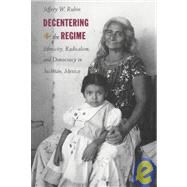Decentering the Regime
, by Rubin, Jeffrey W.- ISBN: 9780822320630 | 0822320630
- Cover: Paperback
- Copyright: 12/1/1997
Since 1989 an indigenous political movement - the Coalition of Workers, Peasants, and Students of the Isthmus (COCEI) - has governed the southern Mexican city of Juchitan. In Decentering the Regime, Jeffrey W. Rubin examines this Zapotec Indian movement and shows how COCEI forged an unprecedented political and cultural path - overcoming oppression in the 1970s to achieve democracy in the 1990s. Rubin traces the history and rise to power of this grassroots movement, and describes a Juchit!n that exists in substantial autonomy from the central Mexican government and Mexican nationalism - thereby debunking the notion that a state- and regime-centred approach to power can explain the politics of domination and resistance in Mexico. Employing an interdisciplinary approach, Rubin shows that the Juchitecos' ability to organise and sustain a radical political movement grew out of a century-long history of negotiation of political rule. He argues that factors outside the realm of formal politics - such as ethnicity, language, gender, and religion - play an important part in the dynamics of regional political struggles and relationships of power. While offering a detailed view of the Zapotec community and its interactions, Rubin reconceptualises democracy by considering the question of how meaningful autonomy, self-government, cultural expression, and material well-being can be forged out of violence and repression. Decentering the Regime will have a major impact on studies of the political history of Mexico, as well as broader discussions of the relations between culture and politics in the fields of political science, anthropology, and postcolonial studies.







